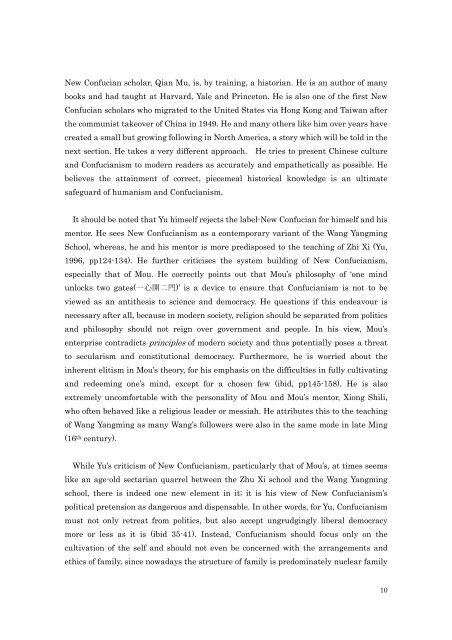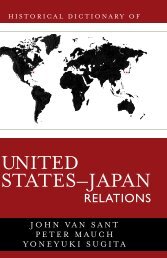Confucian Political Theory in the Face of the Future1 Mon-Han Tsai
Confucian Political Theory in the Face of the Future1 Mon-Han Tsai
Confucian Political Theory in the Face of the Future1 Mon-Han Tsai
You also want an ePaper? Increase the reach of your titles
YUMPU automatically turns print PDFs into web optimized ePapers that Google loves.
New <strong>Confucian</strong> scholar, Qian Mu, is, by tra<strong>in</strong><strong>in</strong>g, a historian. He is an author <strong>of</strong> many<br />
books and had taught at Harvard, Yale and Pr<strong>in</strong>ceton. He is also one <strong>of</strong> <strong>the</strong> first New<br />
<strong>Confucian</strong> scholars who migrated to <strong>the</strong> United States via Hong Kong and Taiwan after<br />
<strong>the</strong> communist takeover <strong>of</strong> Ch<strong>in</strong>a <strong>in</strong> 1949. He and many o<strong>the</strong>rs like him over years have<br />
created a small but grow<strong>in</strong>g follow<strong>in</strong>g <strong>in</strong> North America, a story which will be told <strong>in</strong> <strong>the</strong><br />
next section. He takes a very different approach. He tries to present Ch<strong>in</strong>ese culture<br />
and <strong>Confucian</strong>ism to modern readers as accurately and empa<strong>the</strong>tically as possible. He<br />
believes <strong>the</strong> atta<strong>in</strong>ment <strong>of</strong> correct, piecemeal historical knowledge is an ultimate<br />
safeguard <strong>of</strong> humanism and <strong>Confucian</strong>ism.<br />
It should be noted that Yu himself rejects <strong>the</strong> label-New <strong>Confucian</strong> for himself and his<br />
mentor. He sees New <strong>Confucian</strong>ism as a contemporary variant <strong>of</strong> <strong>the</strong> Wang Yangm<strong>in</strong>g<br />
School, whereas, he and his mentor is more predisposed to <strong>the</strong> teach<strong>in</strong>g <strong>of</strong> Zhi Xi (Yu,<br />
1996, pp124-134). He fur<strong>the</strong>r criticises <strong>the</strong> system build<strong>in</strong>g <strong>of</strong> New <strong>Confucian</strong>ism,<br />
especially that <strong>of</strong> Mou. He correctly po<strong>in</strong>ts out that Mou’s philosophy <strong>of</strong> ‘one m<strong>in</strong>d<br />
unlocks two gates( 一 心 開 二 門 )’ is a device to ensure that <strong>Confucian</strong>ism is not to be<br />
viewed as an anti<strong>the</strong>sis to science and democracy. He questions if this endeavour is<br />
necessary after all, because <strong>in</strong> modern society, religion should be separated from politics<br />
and philosophy should not reign over government and people. In his view, Mou’s<br />
enterprise contradicts pr<strong>in</strong>ciples <strong>of</strong> modern society and thus potentially poses a threat<br />
to secularism and constitutional democracy. Fur<strong>the</strong>rmore, he is worried about <strong>the</strong><br />
<strong>in</strong>herent elitism <strong>in</strong> Mou’s <strong>the</strong>ory, for his emphasis on <strong>the</strong> difficulties <strong>in</strong> fully cultivat<strong>in</strong>g<br />
and redeem<strong>in</strong>g one’s m<strong>in</strong>d, except for a chosen few (ibid, pp145-158). He is also<br />
extremely uncomfortable with <strong>the</strong> personality <strong>of</strong> Mou and Mou’s mentor, Xiong Shili,<br />
who <strong>of</strong>ten behaved like a religious leader or messiah. He attributes this to <strong>the</strong> teach<strong>in</strong>g<br />
<strong>of</strong> Wang Yangm<strong>in</strong>g as many Wang’s followers were also <strong>in</strong> <strong>the</strong> same mode <strong>in</strong> late M<strong>in</strong>g<br />
(16 th century).<br />
While Yu’s criticism <strong>of</strong> New <strong>Confucian</strong>ism, particularly that <strong>of</strong> Mou’s, at times seems<br />
like an age-old sectarian quarrel between <strong>the</strong> Zhu Xi school and <strong>the</strong> Wang Yangm<strong>in</strong>g<br />
school, <strong>the</strong>re is <strong>in</strong>deed one new element <strong>in</strong> it; it is his view <strong>of</strong> New <strong>Confucian</strong>ism’s<br />
political pretension as dangerous and dispensable. In o<strong>the</strong>r words, for Yu, <strong>Confucian</strong>ism<br />
must not only retreat from politics, but also accept ungrudg<strong>in</strong>gly liberal democracy<br />
more or less as it is (ibid 35-41). Instead, <strong>Confucian</strong>ism should focus only on <strong>the</strong><br />
cultivation <strong>of</strong> <strong>the</strong> self and should not even be concerned with <strong>the</strong> arrangements and<br />
ethics <strong>of</strong> family, s<strong>in</strong>ce nowadays <strong>the</strong> structure <strong>of</strong> family is predom<strong>in</strong>ately nuclear family<br />
10













